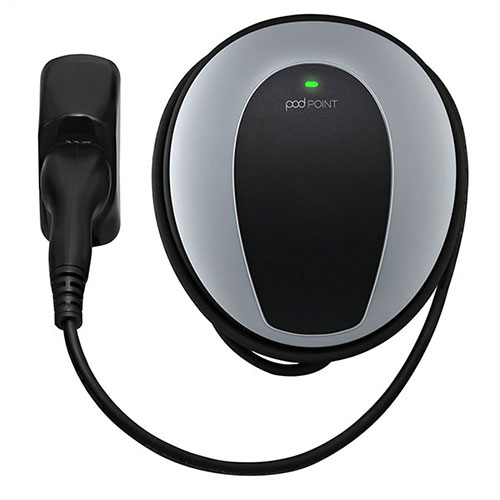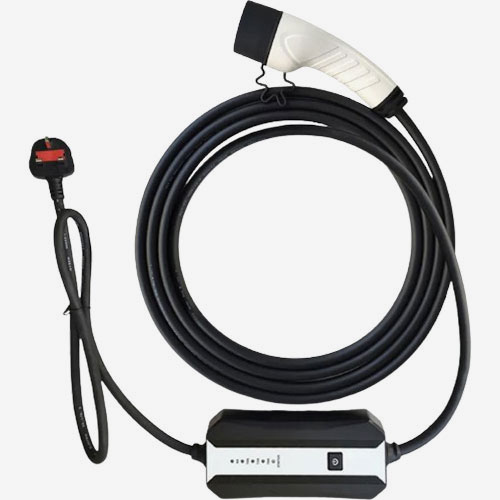
Electric Vehicle Charging & Installation
At Fleetsauce we are proud to partner with Pod Point,
who are one of the UK’s leading providers of electric vehicle charging.
Why choose Pod Point?

Installation Included
90% of customers qualify for standard installation

Charge Scheduling
Charge when your energy tariff is cheapest

Over the air Updates
Ensuring your charger has the latest software and features

3 Year Warranty
Included as standard on all Solo 3 chargers
Why install a Charging Point?
Installing a charging point offers convenience and accessibility for electric vehicles (EV) owners. It ensures that you have a dedicated place to charge your vehicle at home, saving time and hassle compared to relying solely on public charging stations.
Additionally, home charging typically allows for faster charging speeds and can be more cost-effective in the long run. Overall, installing a charging point provides peace of mind and enhances the practicality of owning an EV.
Universal or Tethered?

Has a cable attached (Type 1 - 4.8m or Type 2 - 7.5m)

Connects to all electric cars. No cable included
Tethered Solos have a charging cable permanently attached to them, which can be either Type 1 (4.8m) or Type 2 (7.5m) to match whichever connector your vehicle has. They’re the convenient option as you don’t have to supply a cable separately, but you can’t remove the cable and take it with you.
A universal Solo is more flexible, with you supplying the charging cable. They accept both Type 1 and Type 2 charging cables, so any vehicle can connect to them provided you have the right cable. You can also use this portable charging cable on compatible chargers on the Pod Point Network.
Why choose a dedicated charger over a 3-pin plug?

3 - Pin Plug Cables
• Provides up to 10 miles of range an hour
• No energy or cost insights
• No smart features
• Existing household plug socket wiring is not designed for high load and long duration charging
• Not recommended by vehicle manufacturers for long term use
VS

Solo 3 (7kW)
• Provides up to 30 miles of range an hour
• Pairs with the Pod Point App for better insight on energy usage and spending
• Remotely schedule your charging for when energy is cheapest
• Designed to handle high load charging safely
Power Ratings & Pricing


3.6kW Solo 3
£798 Universal
£849 Tethered
1.6x faster than a 3-pin plug
Provides up to 15 miles range per hour (RPH)

7kW Solo 3
£999 Universal
£1049 Tethered
3x faster than a 3-pin plug
Provides up to 30 miles range per hour (RPH)

22kW Solo 3 *
£1749 Universal
£1999 Tethered
10x faster than a 3-pin plug
Provides up to 90 miles range per hour (RPH)
FAQ
Can I install an EV charger myself?
Is strongly advised not to install an EV charger yourself if you are not experienced or qualified in that department due to the rules and regulations that must be followed to ensure safe installation and compliance.
Is it worth buying a home charger?
This depends on certain factors, as home charge offers that convince that your car can be charged overnight in a safe location, and you can always charge your car. Public charging is an option. However, it would be worth looking to see how many are local too you, key remember they are busy not guarantee be free to charge which lead to you unable to charge your vehicle. It is definitely not a bad investment in EV charging not only easier but can increase property value too.
Do all electric cars use the same charger?
In the UK, most charges are compatible. Some incidents you may have to use you own cable, but this does tend to come with the vehicle. Most UK charging sockets will be Type 1 or Type 2.
What is a Type 1 and Type 2 electric car charger?
The Type 1 charger has 5 pin design and has a latch that keeps the plug-in place to prevent it from being dislodged. A Type 2 charger has a 7-pin design and is the most common one you will come across in the UK. It does have a latch instead has a locking pin which keeps it secure in place.
Is electric cheaper than petrol?
This depends on numerous factors, from the cost of electricity, the time you charge and your location. At home charges are cheaper than public charges especially rapid charging stations and at home chargers can charge at night when electricity rates are low. Overall, it is cheaper than petrol with an average charging an electric car at home costing around £17 for a full charge.
 Expert Advice
Expert Advice  Competitive Prices
Competitive Prices Road Tax & Roadside Assistance
Road Tax & Roadside Assistance Free National Delivery
Free National Delivery Full Manufacturer’s Warranty
Full Manufacturer’s Warranty







